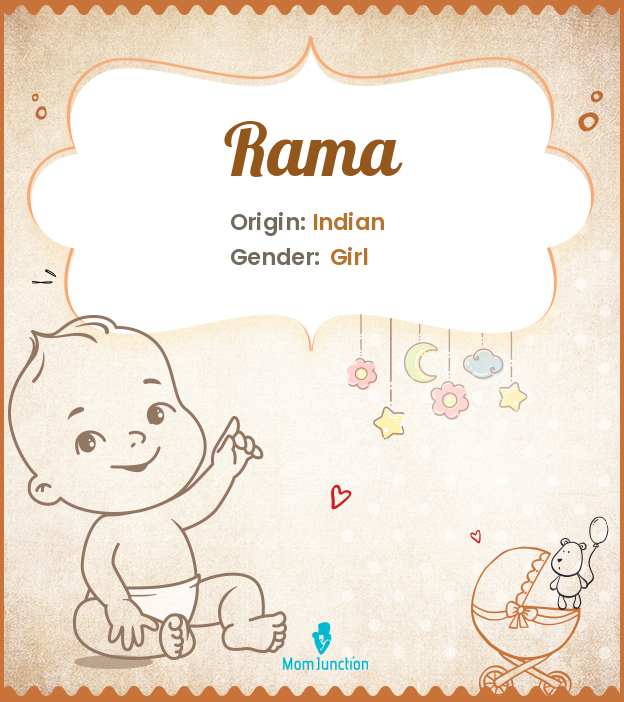Last Updated on July 24, 2025 by Emma
Have you ever wondered about the meaning behind the name Rama and why it resonates with so many across the globe? Whether you’re expecting a new addition to your family or simply exploring the beauty of names, Rama offers a fascinating story rich in history and significance.
This name carries profound meaning and roots that trace back centuries, blending tradition with modern appeal. What makes it so captivating and widely cherished? By delving into its origins and popularity, you’ll uncover why Rama stands out and might just find a deeper connection to it.
Stick around as we explore the enchanting world of this timeless name and discover what makes it truly special for you and your loved ones.
Cultural Significance
Rama, a name rich in cultural roots, holds deep significance in Hindu mythology. Originating from India, it symbolizes virtue and nobility. Its popularity extends globally, representing strength and moral integrity in various cultures.
The name Rama carries deep cultural significance, weaving through various traditions and histories. Its roots stretch across continents, resonating with stories, religions, and personal identities. Understanding Rama’s cultural significance can deepen your appreciation of its rich legacy and contemporary relevance.
Rama In Hinduism
Rama is a central figure in Hinduism, revered as a deity and an ideal king. His story is beautifully narrated in the ancient epic, the Ramayana. This tale highlights themes of duty, honor, and devotion, making Rama a symbol of virtue and righteousness.
Buddhism’s Perspective
In Buddhism, Rama is respected as a Bodhisattva, a being striving for enlightenment. This perspective emphasizes compassion and selflessness. These attributes are associated with Rama’s character, inspiring many followers to embody these qualities in their own lives.
Influence In Southeast Asia
Rama’s influence extends to Southeast Asia, where his story is celebrated through art, dance, and literature. Countries like Thailand and Indonesia incorporate the Ramayana in cultural festivals. These celebrations highlight Rama’s role in uniting communities and preserving cultural heritage.
Rama In Modern Context
Today, the name Rama still holds significant meaning. It transcends religious boundaries and finds its place in modern society. Whether in literature, film, or personal names, Rama continues to inspire new generations with its timeless values.
The Name’s Global Appeal
Rama’s appeal is global, embraced by people from diverse backgrounds. Its simplicity and profound meaning attract parents seeking a name with deep roots. Have you ever considered how a name shapes identity and connects individuals to their heritage?
Understanding the cultural significance of Rama invites reflection on how names carry stories and values. It encourages you to think about the power of names in bridging cultures and connecting people across the world.

Credit: www.youtube.com
Historical Roots
The name Rama holds a rich historical significance. Its roots trace back to ancient times. This name carries a unique blend of cultural and spiritual meanings. Understanding its historical background reveals its enduring popularity and influence.
Origin In Ancient Texts
Rama appears in sacred Hindu texts like the Ramayana. This epic poem tells the story of Lord Rama’s journey and adventures. It is a pillar in Indian mythology, offering moral and spiritual guidance. Rama’s character embodies virtues like courage, duty, and compassion.
Historical Influence In India
Rama’s name has influenced Indian culture profoundly. It is synonymous with heroism and integrity. Stories of Rama inspire art, music, and literature across generations. His tales are celebrated in festivals and rituals, highlighting his lasting impact.
Spread Across Asia
Rama’s influence extends beyond India. Many Asian cultures cherish his story and values. Countries like Thailand and Indonesia have their own renditions of the Ramayana. These adaptations reflect Rama’s universal appeal and timeless relevance.
Rama In Modern Times
Today, Rama’s name remains popular globally. Parents choose it for its historical depth and positive connotations. It symbolizes strength and virtue in contemporary society. Rama continues to inspire people around the world.
Current Trends
Understanding current trends in baby names can be fascinating. The name Rama, rich in cultural and historical significance, is gaining attention worldwide. Parents are increasingly choosing names with deep meanings and unique origins. Rama fits this trend perfectly, offering a blend of tradition and modernity.
Popularity Of Rama In Different Cultures
Rama is widely recognized in Hindu culture. It represents virtue and heroism. In other cultures, Rama’s simplicity and elegance attract parents. The name’s universality makes it appealing across borders.
Rama In Modern Naming Trends
Today, parents seek names that stand out yet feel timeless. Rama’s short and powerful nature aligns with this trend. Its historical significance adds depth, making it a favorite choice for many.
Celebrity Influence On The Name Rama
Celebrity choices often inspire naming trends. Public figures choosing Rama for their children have boosted its popularity. This influence brings attention to the name’s charm and heritage.
Rama In Literature And Media
Rama’s presence in literature and media has increased its popularity. Stories and films featuring characters named Rama keep the name relevant. This cultural exposure resonates with many, enhancing its appeal.
The Future Of Rama As A Baby Name
The future looks bright for the name Rama. As trends evolve, its timeless quality ensures continued interest. Parents will likely embrace Rama for its simplicity and rich background.

Credit: www.youtube.com

Credit: www.momjunction.com
Frequently Asked Questions
What Ethnicity Is The Name Ram?
The name Ram is primarily associated with Indian ethnicity. It originates from Sanskrit and is commonly linked to Hindu culture. Ram is a significant figure in Hindu mythology, symbolizing virtue and strength. The name is popular among Indian communities worldwide.
What Does The Hebrew Name Rama Mean?
The Hebrew name Rama means “height” or “exalted. ” It signifies elevation or a high place in Hebrew culture.
Is Rama A Good Name?
Yes, Rama is a good name. It has cultural significance, meaning joy, beauty, and strength. Popular in many cultures, it holds historical importance and is easy to pronounce, making it an excellent choice for a name.
How Common Is The Name Ram In India?
The name Ram is very common in India, reflecting cultural significance and religious heritage. It is widely used among Hindus, symbolizing devotion to Lord Ram. The name’s prevalence spans across various regions, making it a popular choice for boys in the country.
What Is The Meaning Of The Name Rama?
Rama means pleasing, charming, or delightful in Sanskrit. It is a name with historical significance.
Conclusion
Rama is a name with deep roots and rich history. Its origins trace back to ancient Sanskrit, carrying cultural significance. Today, Rama remains a beloved choice for many parents globally. The name symbolizes strength, virtue, and grace. Its simplicity and elegance make it timeless.
Choosing the name Rama connects children to a legacy of tradition and honor. Its popularity continues to grow, reflecting its universal appeal. Whether for its meaning or sound, Rama stands out. A perfect blend of history and modernity, it remains a meaningful choice for families.

